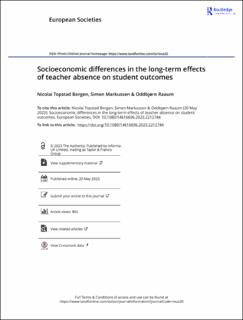Socioeconomic differences in the long-term effects of teacher absence on student outcomes
Peer reviewed, Journal article
Published version
Permanent lenke
https://hdl.handle.net/11250/3115807Utgivelsesdato
2023Metadata
Vis full innførselSamlinger
- Publikasjoner fra Cristin [3269]
- SPS - Documents [424]
Sammendrag
School teachers’ sickness absence has been shown to affect student
achievement in the short run. However, we know little about whether
socioeconomic backgrounds may compensate for reductions in instructional
quality and to what extent teacher absence effects persist over time. This
paper examines the socioeconomic differences in the short- and long-term
effects of teacher absence. We use population-wide Norwegian register data
to study the effects of certified teacher absence during lower secondary
school (grades 8–10) on non-completion of upper secondary education by
age 21 (i.e. school dropout) as well as academic achievement in 10th grade.
In a school fixed effects model, we find that an increase in teacher absence
of 5 percentage points reduces students’ examination grades by 2.3% of a
standard deviation and increases the dropout probability by 0.6 percentage
points. However, the teacher absence effects vary considerably by family
background, with large effects for low-SES students driving the overall
effects. Overall, our findings indicate that reductions in instructional quality
increase social inequality in long-term educational outcomes. This result
highlights that studying heterogeneous impacts of contextual exposures is
needed to understand the role of schools in shaping inequality.

